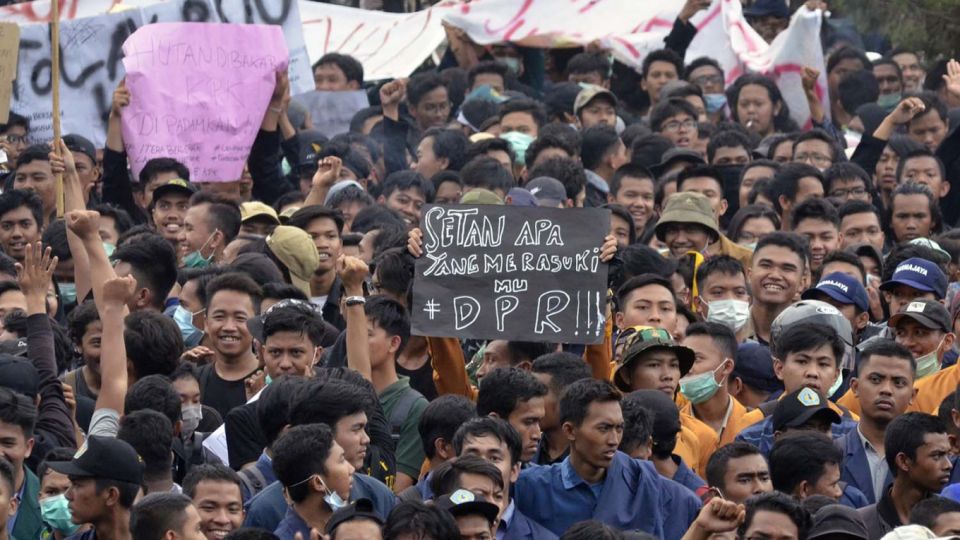October 1, 2019
The wave of protests against the government and the House of Representatives is expected to continue on Monday as the legislative body is scheduled to hold its last plenary session for the 2014-2019 term.
Lini Zurlia, a feminist and lesbian,gay,bisexual and transgender (LGBT) activist who has been involved in the protests since last week, said a demonstration in the capital would be held in front of the legislative compound in Senayan, Central Jakarta, on Monday.
“Many elements [will take part in the demonstration] on Monday,” she told The Jakarta Post on Sunday. “Laborers, farmers, university students, fishermen, and the general public.”
Nailendra, a Yogyakarta university student and spokesperson for the People’s Movement Alliance, the main umbrella group for students who have been protesting since last week, said students in Yogyakarta would also hold another demonstration on Jl. Gejayan on Monday.
#GejayanMemanggil (Gejayan Calling),referring to a three-road junction where students and prodemocracy activists staged protests in 1998, was among hashtags that went viral on social media before nationwide protests started last week.
Nailendra estimated that thousands of protesters would take to the streets on Monday and that there might be “even more people than there were during previous protests.”
Representatives of students from the Jakarta-based Trisakti University, Bandung Institute of Technology (ITB) and University of Indonesia (UI), who had taken part in last week’s protests, however, have yet to confirm their participation in Monday’s protests.
The protests on Monday would be a continuation of a series of large-scale demonstrations occurring throughout last week in Jakarta and other cities across the country, including Bandung in West Java, Palembang in South Sumatra and Makassar in South Sulawesi.
The alliance has outlined seven demands for both the government and the House of Representatives. Among the demands is halting the passage of several problematic bills, including the pending Criminal Code (KUHP) bill.
Another problematic regulation is the new Corruption Eradication Commission (KPK) Law, which was passed within a short period of time despite concerns that it would severely weaken the commission.
Following the protests, the House had decided to postpone the deliberation of the revised KUHP bill and three other bills, namely the correctional procedures bill, land bill and mining bill, in accordance with President Joko “Jokowi” Widodo’s request to the lawmakers on Monday last week.
Jokowi also said on Thursday that he would consider issuing a government regulation in lieu of law (Perppu) to revoke the revised KPK Law.
While many have raised concerns that the final plenary session would be an opportunity for lawmakers to pass some of the controversial bills into law, House Speaker Bambang Soesatyo has assured that there would be no deliberation or decision made on any bill on Monday.
“House members will only hear my closing speech during Monday’s plenary session,” Bambang said on Friday.
Many of the protests last week ended with clashes between protesters and the police with reported violence, including in Jakarta, Jambi and Medan, North Sumatra.
In Kendari, Southeast Sulawesi, two Halu Oleo University students died after taking part in a protest that ended in clashes on Thursday.
A student identified as La Randi died on Thursday afternoon after succumbing to what police have confirmed were gunshot wounds after being shot by an unidentified perpetrator. Another student, identified as M. Yusuf Fardawi, died the next morning after undergoing surgery for severe head injuries.
Jokowi has called for an investigation into their deaths and ordered National Police chief. Gen. Tito Karnavian to probe the entire police force.
Education and Culture Minister Muhadjir Effendy issued on Saturday a circular advising students of senior high schools and vocational high schools to not participate in future rallies.
The minister has advised heads of education agencies in the regions to prevent students from taking part in rallies by ramping up supervision in schools and asking parents to ensure their children go to school.
“High school students are still teachers and parents’ responsibility because the law mandates that they are protected. [They] are no adults yet. They cannot make their own decisions,” Muhadjir said in a statement.
The minister’s advice was supported by East Java Governor Khofifah Indar Parawansa, who said her administration would visit schools to announce the ministry’s circular. She, however, refused to answer whether her administration would punish students that participated in rallies.
Ghina Ghaliya from Jakarta and Asip Hasani from Tulungagung contributed to this story.


